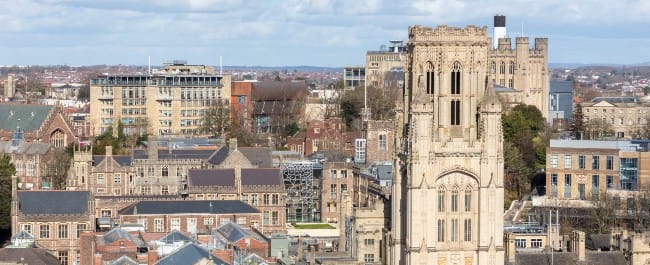
Now and again, massive organisations or businesses in the Tech/IT Industry will set up new branches or headquarters across the world. When this occurs, not only does this bring a massive boost of investment to the local area, but also increases the technological advancement of the area.
In this blog, we’ll be looking at Bristol, as a new “tech giant” enters the playing field.
The engineering and technology giant Dyson has announced plans to invest £100m in a new research and development hub that will open in Bristol, something that the company promises will benefit the region as the centre will open the doors to hundreds of software and artificial intelligence engineer positions.
Dyson is hoping that they will be able to open the new research and development hub opposite Castle Park close to Bristol Bridge. Here is an official depiction of what the research hub will look like when renovated:

The hub will be a huge addition to Bristol and the wider Western region. Furthermore, this will be a step in pushing forward the UK tech sector.
Dyson was founded in Wiltshire by Sir James Dyson more than 30 years ago. If you were wondering whether we are talking about the Dyson you thought of, then yes, Dyson is most famously known for its vacuum cleaners and fans.
However, the tech firm does a lot more than that. Dyson plans to use the Research Hub investment to advance their products’ software, Connectivity, and even AI.
Jake Dyson, son of founder Sir James and the company’s chief engineer, explained, “The new Dyson Technology Centre in Bristol will be a vital hub contributing to Dyson’s connected future.”
When it comes to the initial plans of the Research Hub after opening, the hub will focus on this idea of connectivity. Dyson said that the centre will primarily focus on sensors, apps, and “connectivity” in its future products.
Not only is this great news for the overall UK tech industry, which is looking for ways to incentivise its growth, but the decision may help set an example for other big companies to expand their reach outside of London. Over the years, London has constantly held the top spot when it comes to funding, opportunity, and investment.
Dyson’s decision demonstrates that companies can benefit from casting their eye further afield outside the country’s capital when it comes to where they want to set up shop. But this leaves the question, why choose Bristol?
The Dyson headquarters are based in Malmesbury, Wiltshire. However, industry insiders have admitted that the firm has been struggling to tempt software and AI engineers to the site.
On the other hand, according to TechSpark’s research, Bristol has around 28,000 specialist tech workers. The tech industry in the city is worth around £1.7bn to the regional economy.
This is a great indicator of the current advancement of Bristol’s technology and IT industry, which will only accelerate in the coming years with new investments such as Dyson’s.
To begin with, the new hub will create plenty of jobs. Whilst Dyson already has an office in Bristol that has around 100 tech specialists, a spokesperson of the new centre has said that the new research hub will create hundreds more jobs. Not only will this create more tech specialists in Bristol, but it will also generate more economic wealth in the local area.
But not only is the hub great for UK employment, it comes at a time when the UK tech sector is looking for ways to incentivise its growth.
In terms of software and AI – two fields Dyson’s new research centre will focus on – the UK tech sector is falling behind. The US and China are currently reigning at the top of the tech and AI development race.
The Chancellor has already put forward £900m of the UK Spring Budget toward accelerating our tech sector, with Mr Sunak announcing that an additional £100m in government funding will be put towards a Specialised Tech Task Force to keep up with advancements happening overseas.
At this point, the UK must appear attractive for tech industries to open and invest.
Whilst there has been no official news on how many jobs the new centre will offer, or when exactly it will be open, Dyson’s announcement is still just the kind of step that could help further accelerate Bristol’s advancement and the UK as a whole.
The only question left is what exactly will this new Research Centre achieve in the coming years, and how successful will it prove to be?
I hope you’ve liked this blog and that you’ll stick around to see our future releases, covering everything from recent IT News to Knowledgebase articles. Thanks for reading!

